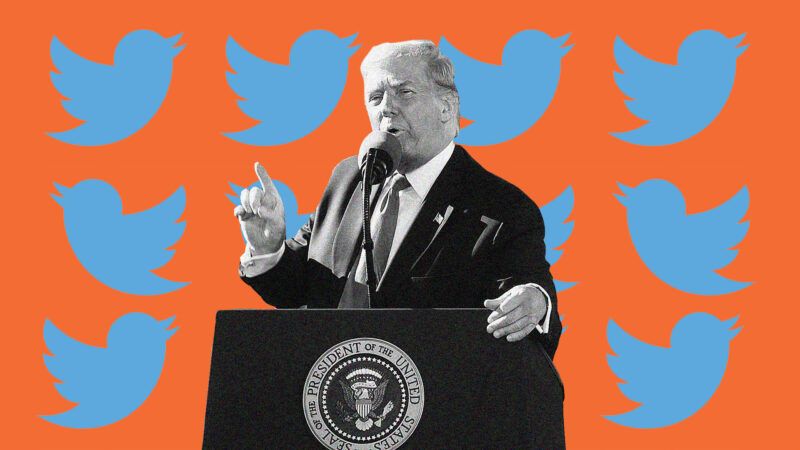Trump's 'Big Tech' Lawsuits Are Ludicrous
Market power does not make a private company the equivalent of a government agency.

No one should be surprised that former President Donald Trump, who according to a USA Today analysis had filed 4,095 lawsuits over three decades by the beginning of his presidency in 2016, has filed a series of "class action" lawsuits against Facebook, Twitter, and Google.
He accuses these firms of violating the First Amendment because they suspended his and other conservatives' social-media accounts. Some politicians act on a set of principles and others go by whatever suits their interests at any given time. If you haven't figured out which category Trump falls into, you haven't been paying attention.
Trump's interest is to stay in the limelight, and pounding the "liberal big tech firms are censoring you" drum helps keep the GOP base energized. It's also a good way to keep the money flowing. Following his press conference announcing the suits, the former president reportedly sent out an email urging his followers to, "Please contribute IMMEDIATELY."
Instead of focusing on Trump's transparent motives, I'll consider the substance of the challenge. But as the Monty Python comedians would note, the Trump team's legal arguments are "wafer thin."
Trump and his allies are smart enough to know that these legal actions have the same chance of success—ballpark zero—as his myriad lawsuits attempting to overturn the presidential election results. For starters, the former president contends that because of their market power and the special privileges these companies receive from government that they are de facto "state actors."
By obliterating the distinction between private companies and the government, Trump can then do an end-run around the plain words of the U.S. Constitution and "force Big Tech to stop censoring the American people," as Trump explained in a Wall Street Journal op-ed. When he writes force, he means government will do the forcing—by meddling in the private decisions made by private actors working in private companies.
Trump's "living and breathing" view of the Constitution would allow the state to tell tech platforms what they may and may not publish. Market power does not make a private company the equivalent of a government agency. On a parallel note, Walmart is an enormous retailer, but we don't want some Bureau of Retail Sales deciding what it sells and where it locates.
The major social-media platforms have immense market share, but they are not actual monopolies because there are no restrictions on competitors entering the market. Just because Facebook is ubiquitous doesn't mean it will always be that way, as any MySpace aficionado will tell you.
Regarding those supposed special privileges, Trump and his allies argue that tech companies receive special protections from Section 230 of the Communications Decency Act, which exempts them from legal liability from the posts that individual commenters make.
That's a privilege, I suppose, much in the same way that forming an LLC shields all corporations from liability—or the way the feds shield religious institutions from taxes and various regulations. On a practical note, eliminating Section 230 will only cause tech companies to become more meddlesome (or refuse to moderate at all and turn their platforms into a cesspool), but that's an issue for another day.
"The fact that they benefit from a federal law does not transform someone into the federal government," Vanderbilt law school professor Brian Fitzpatrick told The Washington Post. "All of us benefit from laws at some point or another and that does not transform us into the federal government." That's exactly right.
Trump's other argument is, "Big Tech has been illegally deputized as the censorship arm of the U.S. government" because of lobbying efforts by federal agencies to push Facebook to remove posts they deem to be disinformation. That bothers me, but unless the feds use their coercive powers, that does not make Facebook an arm of the government.
Nevertheless, the lawsuits thrill many conservatives. One writer for The Federalist recently argued that, "(T)he market versus government dichotomy that undergirds Reaganite Republicanism is wholly incapable of answering the crises we face today."
Sorry, but I'm not willing to obliterate the bright line between private companies and the government simply because of a former president's hurt feelings. Fortunately, I suspect the courts aren't going to do so, either.
